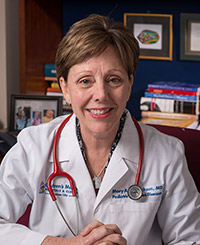HOME | ABOUT US | MEDIA KIT | CONTACT US | INQUIRE
HOME | ABOUT US | MEDIA KIT | CONTACT US | INQUIRE
Mary Anne Jackson was named dean of the University of Missouri – Kansas City’s medical school earlier this month after servicing as interim dean for nearly two years.
Q. Medical school is already an intense environment. Has it become more that way since the COVID-19 outbreak?
A. What’s been stressful for our medical students is in mid-March, not only did we pause the curriculum, and turn everything into an online setting, but we paused their clinical rotations. The reason we did that was to ensure their safety and the safety of patients. There were critical shortages of personal protective equipment, and we didn’t have enough to add learners in who were not primarily integral to the outcomes for the patients. So, we paused that, and we tried to develop online simulations of the clinical rotation, and we’ve been able to successfully do that. But in the midst, it has created some real uncertainty and anxiety on the part of the students, as they know they must get back into that clinical rotation, and not knowing how we are going to do that and keep them on path toward graduation. That’s been the biggest issue. So far so good, but we do have multiple challenges ahead. Having said that, there are 155 ME schools in the country and 89,000 medical students, and we are all in the same situation. Here at UMKC, we will be able to stay ahead of the curve.
 Q. So, it must be hard for them not to have a hands-on situation?
Q. So, it must be hard for them not to have a hands-on situation?
A. Absolutely. There is only so much you can do with simulated clinical experiences. We have an online class that teaches them how to take care of patients in the ICU. It’s obviously not the same thing as being in the intensive care unit. What we have been able to do is turn half of it into an online experience, but maintain that second half as their face-to-face direct-patient-care experience that we need to get them back into. So, we know we have to get the back into it soon because there will be a ripple effect, and we will end up with a backlog of students. The same is true with having them complete the National Medical Board of Examiners’ required subject exams, and step exams that are part of our curriculum, and they have to finish before they advance on. That means we have a very compressed timeline now, and it is in the next three to six months that we are going to have to make sure that they get back in. There are a lot of unknowns at this point, but so far our students remain on path. We want them to trust us and know that we respect their safety and a quality medical curriculum.
Q. Is your curriculum in the future including classes that will involve COVID-19?
A. Yes, we do have a course that is modeled on the Harvard course, and we have a course on pandemics. And we have a very broad medical microbiology course, so our students are getting a lot of education that they wouldn’t have gotten. I’ve constantly had to reflect and say: “There is a silver lining here. What are we learning, and is it going to be valuable for the future?” The fact that is that there are certain pieces of this curriculum that we have had to on-the-fly create and will want to retain for the future. They are gaining the opportunity to learn more about COVID-19, and if they get back into their clinicals, they’ll see it up close and personal. No one across the country is asking these young learners to take care of these patients because of the complexity of caring for them and trying to limit the number of people who traffic into the room and because of the critical PPE shortages that are still out there.